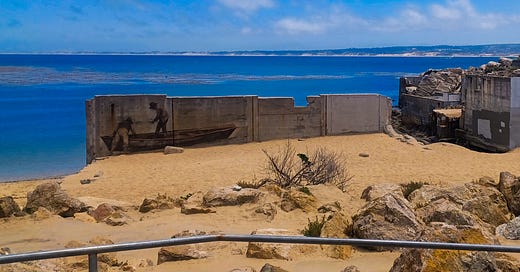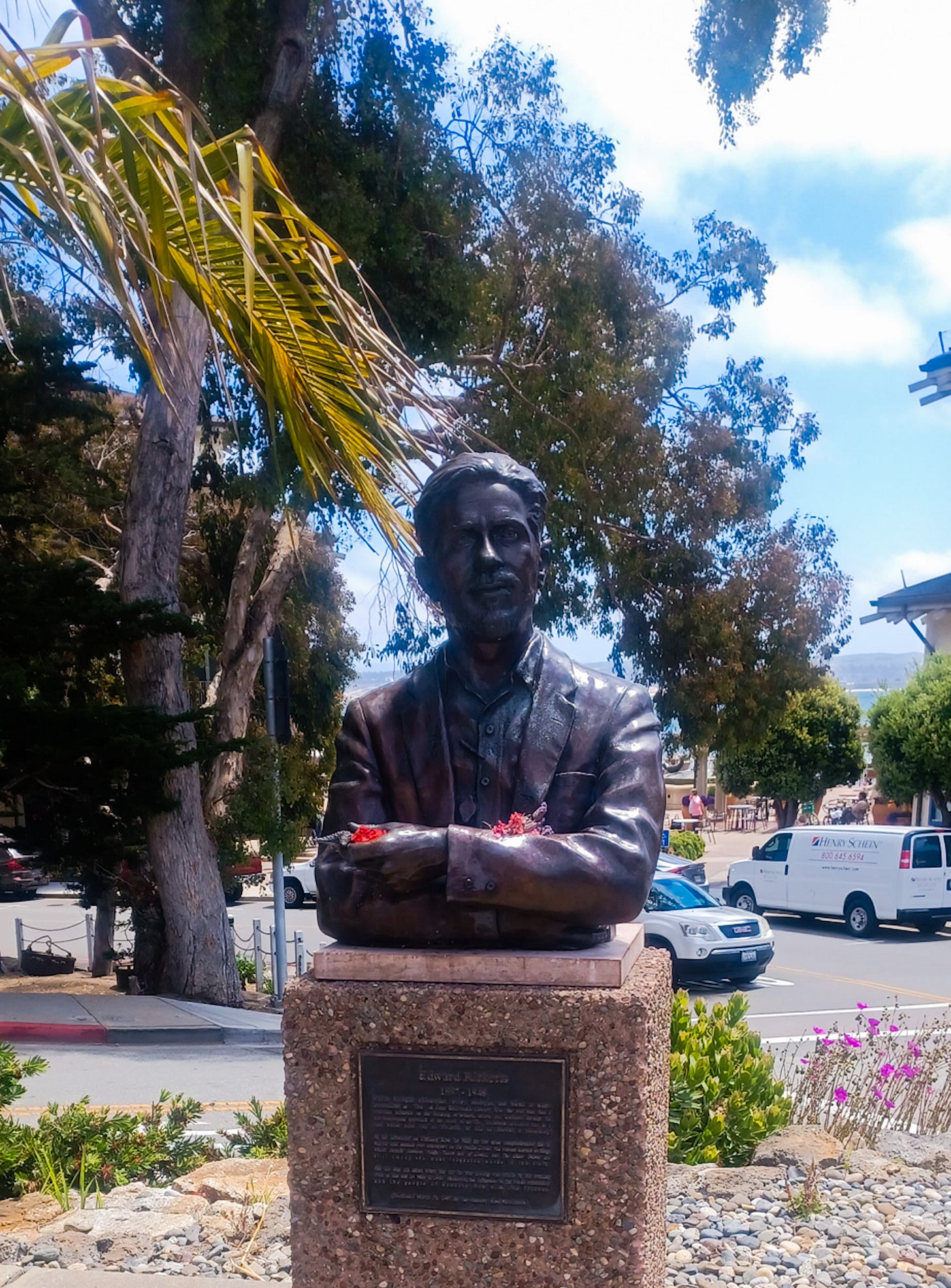A Solstice in Monterey
Notes on the fleeting, the tempting romance of nostalgia, & an incomplete list of places I cried in California
Last week my partner and I traveled to the Bay Area for a wedding and went south a short ways along the California coast to places we’d never been before. It was an incredible trip filled with people in both of our families who we love, friends we love, and some truly stunning landscapes - windswept mountains crashing into the sea and then endless, glittering water. We saw migrating humpback whales and I cried - I cry now just thinking about them.
We spent the solstice in the city of Monterey, made famous by John Steinbeck in his book Cannery Row. I always struggle with finding the kind of ritual that feels correct for an event like the solstice, partly because it feels so slippery - the exact moment when the sun is closest to the earth, the exact moment of the peak - I want to grab onto it and hold it, I want to be transported by it, I want to be transformed. I want to rend the fucking portal asunder. I want something from these moments that is unattainable and so I often feel disappointed, or like I somehow failed to live up to the promise of the occasion, and then I feel a bit silly.
But we had a big day planned for the solstice this year, entirely by accident it just ended up working out that we went to Monterey. I wanted to see Cannery Row very badly. I used to feel (when I was required to read The Grapes of Wrath over the summer before ninth grade, for example) that John Steinbeck was another boring dead white guy writer who had nothing relevant to say about my life. Reading Cannery Row changed that for me.1
It is a book that vividly documents a community of people thrown together by circumstance at a specific time and place - people living on the periphery of society: sex workers, people making homes in abandoned pipes and abandoned buildings, people refusing regular wage work or desperately trying to get by on it, among others. It is a portrait of the way people try to figure out how to make a life together, with all their faults and idiosyncrasies and different ways of being in the world.
Starting in the 1850s, Cannery Row was primarily inhabited by Chinese immigrants who fished the abundant Monterey Bay for decades before the first cannery was built. This community was marginalized and shunted to a tiny geographic area once the canneries multiplied and expanded. The canneries brought jobs, brought economic boom and bust for a time, until the industry collapsed.
Ironically, or perhaps predictably, the 1945 publication and popularity of Steinbeck’s Cannery Row was one of the main drivers of the creation of a tourism industry, which began in the 50s and 60s, with fancy restaurants and souvenir shops where you can buy generic beach-themed tchotchkes replacing the empty and silent old canneries.
I don’t know what I expected to find at Cannery Row in 2023, what remnant or glimmer of the book I hoped to see with my own eyes. I didn’t expect the canneries themselves to be intact, but I especially didn’t expect what we found there, which was a long stretch of souvenir shops, upscale golf equipment shops, and four-star hotels. I think the thing that sticks in my craw so much about this specific kind of industry being in this specific place is this: Cannery Row the book is about a community of people who lived and worked there, who made hardscrabble cobbled-together lives for themselves finding ways to take care of each other, and Cannery Row today is a tourist attraction geared entirely towards wealthy outsiders, people who don’t live or have any connections to the place (obviously, me included!).
Alicia Kennedy problematizes this beautifully in her writing on food tourism, which I think can be applied to tourism more generally. Many tourists don’t want to feel like tourists - they want to have an authentic experience, they want to feel like they are on the inside, they are a part of something. I recognize my own desires here; I think they are very human.
Kennedy quotes Rebecca Solnit from The Book of Migrations:
“The vast and ever-expanding industry of tourism threatens to turn the whole world into a series of theaters whose companies perform palatable versions of their culture and history. Tourists thus possess a perverse version of Midas’s touch: the authenticity and exoticism they seek is inauthenticated and homogenized by their presence.”
Maybe what felt so strange and disorienting about the experience is the total normalcy of this change. Nobody seemed to find it remarkable, the difference between then and now. People seemed excited to wander in and out of the shops, taking hurried selfies in front of the monument to historic Cannery Row (the one that had working canneries) before rushing off to get to their seaside lunch reservations. And of course they did - that’s what they came for.
And that makes me think that I’m the only one who’s confused. I felt foolish at the size and drama of my feelings. A little bit of a rube, a little bit of a bumpkin. But I felt how I felt and I’ve learned that trying to fight with my feelings in the moment they’re happening only makes me feel so much worse. The second arrow and all that.
Anyway, I wept at the statue of Ed Ricketts, which marks the place he was hit by a train in his car in 1948. People pick flowers and put them in the statue’s hands. In Cannery Row, Doc, the character based on Ricketts, is the person the people of the community go to for all kinds of help - the kinds of help you need when you can’t afford to pay a doctor or a social worker or a teacher or a veterinarian. For these services he is universally beloved by everyone there.
In my reaction to the current condition of Cannery Row I see the same issue that I confront in myself on every solstice - the desire to hold onto something that is not fixed, that cannot be held even for a moment. The Cannery Row that lives in Steinbeck’s book exists only there - in another sense it only ever lived in the minds of the people who were there at the time, fracturing into innumerable subjective experiences.
Steinbeck’s rendering is completely suffused with the golden saturation of the romance of nostalgia - something that I am admittedly an absolute sucker for. Whole chunks of my own life have this same quality - they are made up of a specific group of people and time of life and a million unquantifiable atmospheric details and as such are absolutely impossible to replicate. For me it’s things like dumpster diving bread from the grocery coop in Iowa City and distributing it to strangers smoking outside the bars, or throwing the chopped remains of the corn harvest at each other in rural Pennsylvania, or lying down gleefully in the middle of the road in Portland. We all have these parts of our lives that still feel vitally alive inside us, that only make sense in the larger context and sometimes not even then.
Writing a novel like Cannery Row is its own way of trying to hold onto something that cannot be held. I see my own desires in this impulse as well - for whatever reason this is something I need to be constantly reminded of, a lesson I seem to never learn. I can’t stop writing things down, trying to document all of the events and thoughts and dreams as they arise - it is the exercise in futility that these days I am most addicted to, that I can’t seem to quit trying for. Luckily the world is ready to remind me at every turn: don’t hold on too tightly - if you look you’ll see that there is already nothing in your hands.
Thanks for being here - see ya next time.
This is not to say that the book is without problems. Steinbeck was of his time - which means that he says some shit we now would consider racist and sexist and ableist. Categorically I think it’s better to acknowledge this and to have that conversation about these writers and their perspectives rather than to avoid reading them altogether.







I can’t tell you how often I’ve wanted to articulate that strange blend of otherness and fierce loyalty and nostalgia and disappointment and hope - this hits the mark square in the center. Wonderfully rendered - thank you so much 💚
My skimming eyes keep reading the title as “Solace in Monterey”